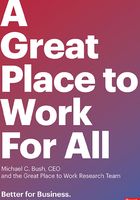
A New Era for Great Place to Work
We began to focus on the way many great workplaces have been great for some but not all in 2015. That’s when I joined Great Place to Work as CEO. I knew employees at many of our Best Workplaces—and knew some of these people were not having a great experience. What’s more, as I met with customers they pushed us to innovate our methodology, given the new challenges their businesses were facing.
So we dug into our data. The resulting analysis created a new purpose for us. If we’re going to call a company “great,” it’s got to be great for everybody. It’s got to be a Great Place to Work...For All.
A Great Place to Work For All has six components we now measure:
1. Values
2. Innovation
3. Financial Growth
4. Leadership Effectiveness
5. Maximizing Human Potential
6. Trust
The first four items make sense to any leader running an organization. Item 5, Maximizing Human Potential, resulted from a review of our survey data, which showed significant discrepancies in the work experience between executives and those on the front lines. Between men and women. Between different generational cohorts. Between people of different ethnic and racial identities.
So we decided to raise the bar in our model and our methodology to reflect the new For All standard. Central to our new approach is maximizing human potential; we are now assessing how well companies create a consistently positive experience for all employees, no matter who they are or what they do for the organization. We made this shift to reflect the reality of the world today, and to recognize and learn from the inclusive organizations that are setting the pace. Not just for moral reasons but for business reasons. Our most recent research shows companies that rate most highly according to our new For All standard grow revenue three times faster than their less-inclusive rivals.
In other words, while trust fuels business performance at great workplaces, For All accelerates it. In a separate study, we found the organizations scoring highest using our new For All methodology grew their revenue about 10 percent faster over the same period than the companies that scored best according to our old methodology, which simply measured average levels of trust, pride, and camaraderie (see Figure 6 on page 28).
“
In the emerging economy, leaders have to create an outstanding culture for everyone, no matter who they are or what they do for the organization. They have to build Great Places to Work For All.
”
It makes sense that For All organizations race ahead, because now business success relies on developing all your human potential. Every employee matters in an economy that is about connectivity, innovation, and human qualities like passion, character, and collaboration.
The upshot is, in the emerging economy, the Best Workplaces can do better—much better. And they must. They have to work in new ways and with new behaviors to create an outstanding culture for everyone, no matter who they are or what they do for the organization.
The same is true for all organizations. To survive and thrive in the future, organizations have to build Great Places to Work For All.